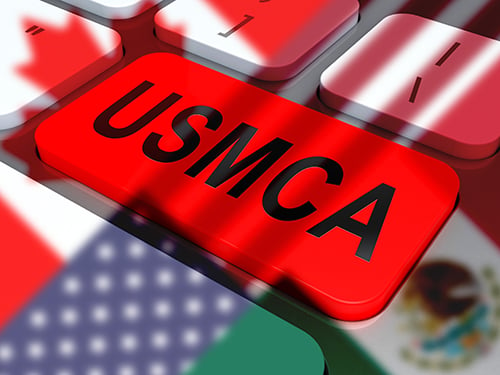
Magna International’s director of customs compliance and trade governance, Karin Muller, wants suppliers to know that they are not alone in their struggles to comply with the new United States-Mexico-Canada Agreement (USMCA).
Muller, who is moderating a compelling panel discussion on the USMCA certification process at AIAG’s 2020 Customs Town Hall on November 4, 2020, is encouraging suppliers to participate and learn about USMCA best practices as well as what others are doing to work through the pain points.
Panelists include Steven Britt, senior manager, customs, North America for FCA US; Frankie Bryson, director, alliance customs and trade, North America for Nissan; Kristen Gibson, senior manager — supply chain management for American Axle; and Krystyna Chwilka, customs compliance manager for Martinrea International.
Muller has over 40 years customs and trade experience in various senior consulting, operation, and management roles. Her expertise includes import and export logistic requirements, regulations, and processes. Muller has been a featured speaker in the United States and Canada for various trade organizations and local Chambers of Commerce addressing import and export topics such as country of origin, trade agreements, and coordination of activities between the United States, Canada, and Mexico.
Muller, whose current role includes managing a Global Trade Management Program to establish sustainable trade compliance throughout Magna, is passionate about communicating the importance of trade compliance and its impact on a company’s bottom line.
In this brief interview, Muller talks about the USMCA challenges and previews what Custom Town Hall participants can expect to learn from her panel discussion. (Please visit AIAG’s USMCA web page for more information, resources, and training.)
Q: What is the focus of the AIAG USMCA Work Group that you lead?
 Muller: The group is co-chaired by Lear’s Steve Gardon and me. We felt that pulling together a group of customs technical-minded people from both vehicle producers and suppliers would help the auto sector simplify and minimize the administrative burden the new USMCA agreement will impose on our industry. The work group is a forum to share pain points and best practices and serves to some extent like a sanity check for us all.
Muller: The group is co-chaired by Lear’s Steve Gardon and me. We felt that pulling together a group of customs technical-minded people from both vehicle producers and suppliers would help the auto sector simplify and minimize the administrative burden the new USMCA agreement will impose on our industry. The work group is a forum to share pain points and best practices and serves to some extent like a sanity check for us all.
Q: What are the work group’s priorities?
Muller: Our priorities include:
- Attempting to standardize documentation to streamline and minimize the added administrative burden.
- Understanding the roles and responsibilities of suppliers and vehicle producers and facilitating a mutual understanding between them.
- Seeking clarification so all parties are on the same page in interpreting the rules.
- Identifying processes and related challenges that did not previously exist and implications to the sector from both a supplier and OEM perspective.
- Creating industry-wide training.
Q: What are the challenges in the USMCA certification process? What do automotive companies need to know?
Muller: There are several challenges, including inconsistencies and confusion in interpreting the automotive rules of origin and when to use the Automotive Tables (core, principal, complementary). There has been pushback from suppliers on data collection. Also, under NAFTA, we followed a calendar year. However, USMCA came out mid-year so there’s confusion about the mid-year blanket certification period. Tier Ones are asking suppliers for USMCA certification document for July 1st through December 31st period, and then there will have to be another solicitation process for January through June 2021.
Other challenges include inconsistencies in the certification process, as the certification template and data are being requested from customers and Tier One suppliers. There is confusion about the supplier’s role in providing Labor Value Content data to vehicle producers. Do they have to provide the data, and if so, what kind? Some customers are asking for actual data, but that’s not required. It should just be a yes or no.
I’d also add the U.S. Merchandise Processing Fee to the list of challenges. It’s payable with no certification and not refundable if it is paid. This puts added pressure on the supply base to complete the certification to the best of their ability, which might not always be correct.
Q: What are some of the ideas you’re working with to address these pain points?
Muller: We continue to meet at the working group level to talk through some of the challenges. We are so overwhelmed in the solicitation process that we haven’t started discussing any new ideas. But it’s an important question that the working group must consider: Where do we go from here?
Q: What is the most important thing automotive companies need to keep in mind as they move forward with USMCA?
Muller: Everyone is in the same boat. We are all learning the ropes at the same time. As a result, there are confusion and inconsistencies in interpreting the rules, etc.
Patience is key. Like NAFTA, however, it will calm down, and companies will start being on the same page as we all progress through the pain together. It will take a couple of years before we see that happen, as there are a lot of new requirements that need to be fully understood by all parties, including each country’s customs administration.
The Customs Town Hall participants on November 4th will learn USMCA best practices and hear from others about the pain points they are experiencing. It is very important for suppliers to understand that they do not have to work through this alone.

